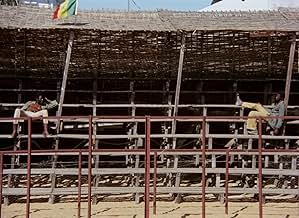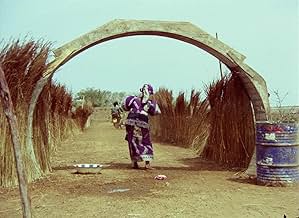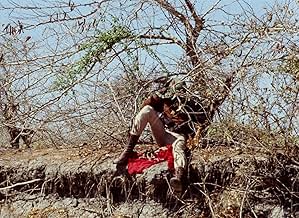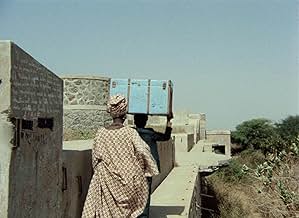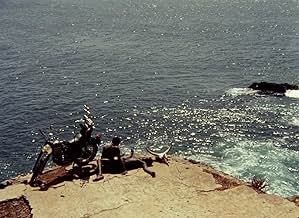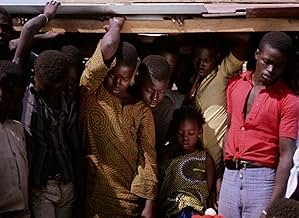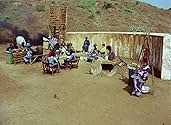IMDb-BEWERTUNG
7,0/10
4429
IHRE BEWERTUNG
Der Viehhirte Mory und die Studentin Anta versuchen, genügend Geld zusammenzubekommen, um nach Paris gehen und ihre langweilige Vergangenheit hinter sich lassen zu können.Der Viehhirte Mory und die Studentin Anta versuchen, genügend Geld zusammenzubekommen, um nach Paris gehen und ihre langweilige Vergangenheit hinter sich lassen zu können.Der Viehhirte Mory und die Studentin Anta versuchen, genügend Geld zusammenzubekommen, um nach Paris gehen und ihre langweilige Vergangenheit hinter sich lassen zu können.
- Regie
- Drehbuch
- Hauptbesetzung
- Auszeichnungen
- 2 Gewinne & 1 Nominierung insgesamt
Myriam Niang
- Anta
- (as Mareme Niang)
Josephine Baker
- Joséphine Baker
- (Synchronisation)
- (as Joséphine Baker)
Empfohlene Bewertungen
First, I didn't like the movie because I felt I wasn't able to enjoy it really. It made the impression of a TV documentary on how livestock is mistreated in Western Africa.
Then, by quite confusingly repeating a scene scored by somewhat mystical pop music, the film turned to the other extreme and made me consider it over-sybolistic.
Then, finally, the actual story began, and I could figure out various things. I could separate dream from reality, although this was not so easy, and I thought the film was too clichéd at some moments (e. g. the fat gay man, who was charming but a little camp).
Now that the film is over and I thought back to it I believe it is not at all a bad movie. Many discontinuities and an unusual narrative style are something we should welcome. Regarding the images and colours it is a wonderful piece of work. The film seems like brilliant illustration of an average story.
Then, by quite confusingly repeating a scene scored by somewhat mystical pop music, the film turned to the other extreme and made me consider it over-sybolistic.
Then, finally, the actual story began, and I could figure out various things. I could separate dream from reality, although this was not so easy, and I thought the film was too clichéd at some moments (e. g. the fat gay man, who was charming but a little camp).
Now that the film is over and I thought back to it I believe it is not at all a bad movie. Many discontinuities and an unusual narrative style are something we should welcome. Regarding the images and colours it is a wonderful piece of work. The film seems like brilliant illustration of an average story.
Mory, a cowherd, and Anta, a university student, try to make money in order to go to Paris and leave their boring past behind.
This film looks great and is just very interesting from the whole clash of cultures perspective. You have some African tradition here, and mixed in with that you have some Muslim practices. I am no expert, but I suspect Islam in Senegal is much different than in the Middle East. It's an interesting blend. And then, of course, you have the modern world of France, which is different from either of those cultures.
What may strike viewers the most, especially because it happens so early in the film (and is repeated later), is the slaughter of the cattle. Whether the methods shown are humane or not, I have no idea. But they look brutal, and to the modern world it may be a shock to see something that has become so far removed from our everyday life. Now, food is food, and we rarely see that once upon a time it was a living thing.
This film looks great and is just very interesting from the whole clash of cultures perspective. You have some African tradition here, and mixed in with that you have some Muslim practices. I am no expert, but I suspect Islam in Senegal is much different than in the Middle East. It's an interesting blend. And then, of course, you have the modern world of France, which is different from either of those cultures.
What may strike viewers the most, especially because it happens so early in the film (and is repeated later), is the slaughter of the cattle. Whether the methods shown are humane or not, I have no idea. But they look brutal, and to the modern world it may be a shock to see something that has become so far removed from our everyday life. Now, food is food, and we rarely see that once upon a time it was a living thing.
Two young people attempt to escape the poverty of their native Senegal and move to Paris. They raise some funds by committing petty crimes.
Touki Bouki is a very distinctive film that's for sure. The African continent hasn't been renowned for producing a great deal of important movies but this one certainly qualifies as such. It has a pretty basic story-line but it's not a plot-driven affair at all really. In actual fact it is quite experimental in approach much of the time and seems to have been influenced by the European New Wave films quite a bit. But what gives it its edge is that within that it is very specifically Senegalese. It's not often we see much from this part of the world represented in cinema, especially not from over forty years ago and certainly rarely from actual Senegalese film-makers. It's this Senegalese colour and authenticity, combined with the bold experimental cinematic presentation that makes this one very much stand out. In truth, I don't think I fully appreciated all its nuances on first viewing and would certainly like to return to it sometime in the future. Be warned though, it does contain some pretty brutal scenes of animal slaughter which make for difficult viewing. All-in-all though, this unusual film has a great deal of character and its strong sense of location makes for fascinating viewing.
Touki Bouki is a very distinctive film that's for sure. The African continent hasn't been renowned for producing a great deal of important movies but this one certainly qualifies as such. It has a pretty basic story-line but it's not a plot-driven affair at all really. In actual fact it is quite experimental in approach much of the time and seems to have been influenced by the European New Wave films quite a bit. But what gives it its edge is that within that it is very specifically Senegalese. It's not often we see much from this part of the world represented in cinema, especially not from over forty years ago and certainly rarely from actual Senegalese film-makers. It's this Senegalese colour and authenticity, combined with the bold experimental cinematic presentation that makes this one very much stand out. In truth, I don't think I fully appreciated all its nuances on first viewing and would certainly like to return to it sometime in the future. Be warned though, it does contain some pretty brutal scenes of animal slaughter which make for difficult viewing. All-in-all though, this unusual film has a great deal of character and its strong sense of location makes for fascinating viewing.
An African film here about youth, about the thirst to escape from a place that parches it and the bike ride through dirt roads out to sea where a ship sails for Europe. But I want to avoid merely a museum visit or an aesthetic token from a faraway place, I want the heart that pounds behind appearances and gives rise to their breeze of color. What heart here?
First are the things he says about the home that is left behind. Symbolic cows being led to slaughter and cut to the young lead riding his motorbike with cow horns on the wheel. A stolen chest, supposedly full of money to pay for a DeGaulle statue but it contains a corpse.
These are the things the filmmaker knows exactly what he wants to say about. They're also the least interesting to watch for me. The young lead being wrestled by leftist students is intercut with cows being wrestled before the slaughter. The dear bike stolen by a savage white man and left broken while he's extracted with merely a broken leg. Not without nuance, but some of it is as didactic as we make fun of Hollywood.
More tantalizing is the journey through these to outrun them, even more so once you realize this is the same journey the filmmaker himself made from that same port. A yearning for freedom, but the desired freedom is a life of material comforts in Europe, what every boy his age would dream about, cafés and girls. Meanwhile the girl meekly tugs along behind her childish man. There's a sense that she quietly yearns for more; but she also feels beautiful in the (stolen) pink suit and red hat, as any girl would. I like films where youth is embraced with its dreams and folly, this is one.
But also a deeper heart, things which the filmmaker doesn't know how to express clearly but vaguely feels stirring. There are a few of these where the surface of the film is rippled by some hidden vortix that seems to rage in the deep, like when the girl thinks he has drowned. If the journey is Godard, this is Pasolini. This might be part of what some reviews note as sloppy technique. True. This is a man still trying to fathom how images can surround a feel.
So this is it here, a journey where as these two lovers flee, they get caught up in situations that tear from them images of who they are and what their surrounding world is like, images the air takes along which become the film. In the end one self is left behind, the one who has not outrun this world.
First are the things he says about the home that is left behind. Symbolic cows being led to slaughter and cut to the young lead riding his motorbike with cow horns on the wheel. A stolen chest, supposedly full of money to pay for a DeGaulle statue but it contains a corpse.
These are the things the filmmaker knows exactly what he wants to say about. They're also the least interesting to watch for me. The young lead being wrestled by leftist students is intercut with cows being wrestled before the slaughter. The dear bike stolen by a savage white man and left broken while he's extracted with merely a broken leg. Not without nuance, but some of it is as didactic as we make fun of Hollywood.
More tantalizing is the journey through these to outrun them, even more so once you realize this is the same journey the filmmaker himself made from that same port. A yearning for freedom, but the desired freedom is a life of material comforts in Europe, what every boy his age would dream about, cafés and girls. Meanwhile the girl meekly tugs along behind her childish man. There's a sense that she quietly yearns for more; but she also feels beautiful in the (stolen) pink suit and red hat, as any girl would. I like films where youth is embraced with its dreams and folly, this is one.
But also a deeper heart, things which the filmmaker doesn't know how to express clearly but vaguely feels stirring. There are a few of these where the surface of the film is rippled by some hidden vortix that seems to rage in the deep, like when the girl thinks he has drowned. If the journey is Godard, this is Pasolini. This might be part of what some reviews note as sloppy technique. True. This is a man still trying to fathom how images can surround a feel.
So this is it here, a journey where as these two lovers flee, they get caught up in situations that tear from them images of who they are and what their surrounding world is like, images the air takes along which become the film. In the end one self is left behind, the one who has not outrun this world.
Disorienting and at times even a bit schizophrenic, this is an extraordinarily vibrant, pulsating, and eccentric film. Comparisons to the anarchic, jumpy, free-associative style of the French New Wavers are not far off, but there's something much more erotic and carnal in the film's playfulness.
The story of self-assured college beauty Anta and her fella - Mory the motorcycle-riding herdsman - starts in Dakar and wistfully wanders toward Paris, the seemingly unattainable city of their dreams. Their get-rich-quick schemes and the breezy, colorful manner in which they unfold are funny and inspired.
Along the way, there are sequences of both utter hilarity and genuine depth, although the film does sometimes seem unsure of its many potentially-symbolic representations. But the stylistic narrative and experimental technical aspects are so full of ideas that talk of the film's minor weaknesses seems trivial.
The soundtrack is outstanding, full of syncopation and polyrhythms pacing the film and giving a rich texture to the images. And there's constant movement, until the film's denouement where character, story, camera and concept fuse together in common paralysis, where all seems frozen in reflection.
The story of self-assured college beauty Anta and her fella - Mory the motorcycle-riding herdsman - starts in Dakar and wistfully wanders toward Paris, the seemingly unattainable city of their dreams. Their get-rich-quick schemes and the breezy, colorful manner in which they unfold are funny and inspired.
Along the way, there are sequences of both utter hilarity and genuine depth, although the film does sometimes seem unsure of its many potentially-symbolic representations. But the stylistic narrative and experimental technical aspects are so full of ideas that talk of the film's minor weaknesses seems trivial.
The soundtrack is outstanding, full of syncopation and polyrhythms pacing the film and giving a rich texture to the images. And there's constant movement, until the film's denouement where character, story, camera and concept fuse together in common paralysis, where all seems frozen in reflection.
Wusstest du schon
- WissenswertesThis film is believed to be Africa's first avant-garde film, although Soleil Ô (1970) could also make this claim.
- VerbindungenFeatured in Caméra d'Afrique (1983)
- SoundtracksParis, Paris, Paris
(Madrid) (uncredited)
Music by Agustín Lara
Spanish lyrics by Agustín Lara
French lyrics by Georges Tabet
Performed by Josephine Baker
Top-Auswahl
Melde dich zum Bewerten an und greife auf die Watchlist für personalisierte Empfehlungen zu.
- How long is Touki Bouki?Powered by Alexa
Details
Box Office
- Weltweiter Bruttoertrag
- 180 $
- Laufzeit1 Stunde 25 Minuten
- Sound-Mix
- Seitenverhältnis
- 1.37 : 1
Zu dieser Seite beitragen
Bearbeitung vorschlagen oder fehlenden Inhalt hinzufügen


